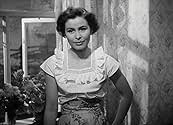IMDb RATING
7.2/10
3.5K
YOUR RATING
Two violinists playing in the same orchestra fall in love and get married, but they can't get along.Two violinists playing in the same orchestra fall in love and get married, but they can't get along.Two violinists playing in the same orchestra fall in love and get married, but they can't get along.
Staffan Axelsson
- Lasse - Age 3
- (uncredited)
Astrid Bodin
- Guest at Marta's Birthday Party
- (uncredited)
Tor Borong
- Expecting Father at the Maternity ward
- (uncredited)
Ernst Brunman
- Concert Hall Doorkeeper
- (uncredited)
Eva Fritz-Nilsson
- Lisa - Age 3
- (uncredited)
Agda Helin
- Nurse
- (uncredited)
Svea Holm
- Mother at the Maternity Ward
- (uncredited)
Berit Holmström
- Lisa
- (uncredited)
Svea Holst
- Nurse
- (uncredited)
Maud Hyttenberg
- Toy Shop Assistant
- (uncredited)
- Director
- Writer
- All cast & crew
- Production, box office & more at IMDbPro
Storyline
Did you know
- TriviaOne of four Ingmar Bergman films never released theatrically in the US, although it did appear in America on videotape in 1984, and on Blu-ray in 2018
- ConnectionsFeatured in Victor Seastrom (1981)
- SoundtracksSYMPHONY NO 9, OP. 125 ('AN DIE FREUDE')
Music by Ludwig van Beethoven
Featured review
This seems to be a deeply personal work for Bergman, and it's interesting that the backdrop to the story is classical music. We get extended sequences of an orchestra practicing or performing, and the music exudes a feeling of being grand, joyful, perfect, and immortal, whereas by contrast the lives of these characters are small, sad, flawed, and fleeting. It's hard to know how much of the story is Bergman flagellating himself for the failure of his second marriage and his inadequacies as a young artist, but regardless, I love the film for its raw honesty, and for showing the husband to be the childish, insecure, and selfish one in this couple's marriage. They both seem to seek authenticity and meaning early on in their relationship, and start off their marriage promising to be honest and kind to one another, but inevitably things deteriorate, the entropy of which is (in various forms) a recurring theme in Bergman's work.
I loved the shot on the boy at the end, it's powerful, but in the overall scene, I would have preferred an even more somber sequence amidst that soaring music. (It's hard to believe I'm saying I would have preferred something being more somber in a Bergman film, so I hope that's not saying more about me than I'm saying about the film, hehe) Anyway, it was wonderful to see legendary director Victor Sjöström as the cranky orchestra conductor, just as he'd appear later for Bergman in 'Wild Strawberries,' and look for Bergman himself in a cameo in the doctor's office.
A few quotes: Bergman seemingly through Stig (Stig Eriksson): "I'll tell you the secret of real art. It's created when you're unhappy. I prefer being unhappy. God knows it's the state I usually find myself in."
And maybe Bergman through Marta (Maj-Britt Nilsson): "There's so much misery, laziness, and indifference, in body and in mind. In the end you don't believe in anything. You think that's just how it is. That's the whole meaning. (Stig: There doesn't have to be a meaning.) Yes there does. If there isn't, you make you one up. Otherwise you can't go on living."
And lastly this one, Bergman on music in 1960: "I would say that there is no art form that has so much in common with film as music. Both affect our emotions directly, not via the intellect. And film is mainly rhythm; it is inhalation and exhalation in continuous sequence. Ever since childhood, music has been my great source of recreation and stimulation, and I often experience a film or play musically."
I loved the shot on the boy at the end, it's powerful, but in the overall scene, I would have preferred an even more somber sequence amidst that soaring music. (It's hard to believe I'm saying I would have preferred something being more somber in a Bergman film, so I hope that's not saying more about me than I'm saying about the film, hehe) Anyway, it was wonderful to see legendary director Victor Sjöström as the cranky orchestra conductor, just as he'd appear later for Bergman in 'Wild Strawberries,' and look for Bergman himself in a cameo in the doctor's office.
A few quotes: Bergman seemingly through Stig (Stig Eriksson): "I'll tell you the secret of real art. It's created when you're unhappy. I prefer being unhappy. God knows it's the state I usually find myself in."
And maybe Bergman through Marta (Maj-Britt Nilsson): "There's so much misery, laziness, and indifference, in body and in mind. In the end you don't believe in anything. You think that's just how it is. That's the whole meaning. (Stig: There doesn't have to be a meaning.) Yes there does. If there isn't, you make you one up. Otherwise you can't go on living."
And lastly this one, Bergman on music in 1960: "I would say that there is no art form that has so much in common with film as music. Both affect our emotions directly, not via the intellect. And film is mainly rhythm; it is inhalation and exhalation in continuous sequence. Ever since childhood, music has been my great source of recreation and stimulation, and I often experience a film or play musically."
- gbill-74877
- Jul 7, 2019
- Permalink
- How long is To Joy?Powered by Alexa
Details
Box office
- Gross worldwide
- $5,135
- Runtime1 hour 38 minutes
- Color
- Sound mix
- Aspect ratio
- 1.37 : 1
Contribute to this page
Suggest an edit or add missing content































